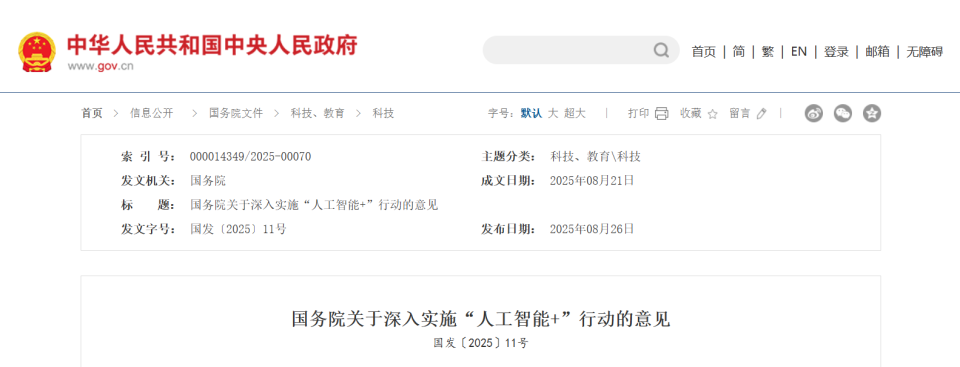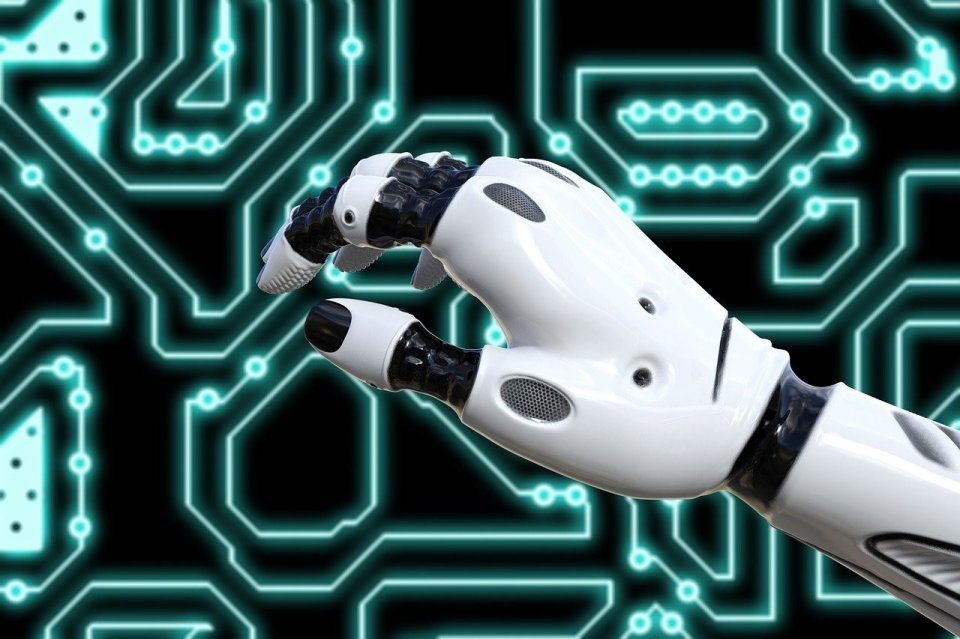On 26 August 2025, the State Council issued the ‘Opinion on Deepening the Implementation of the “Artificial Intelligence Plus” Initiative’ (hereinafter referred to as the ‘Opinion’), aimed at promoting the extensive and deep integration of artificial intelligence across all sectors and fields of the economy and society.

01 Policy Blueprint: Three-Phase Objectives, Six Key Action Areas
The Opinions outline clear three-phase development targets: by 2027, 2030, and 2035, the adoption rate of next-generation smart terminals, smart devices, and other applications shall exceed 90%, with the smart economy becoming a vital growth engine for China's economic development.
By 2035, China shall comprehensively enter a new phase of smart economic and societal development, providing robust support for the fundamental realisation of socialist modernisation.
The Opinions focus on six key action areas—scientific and technological advancement, industrial development, consumption enhancement, public welfare, governance capabilities, and global cooperation—encompassing virtually all facets of economic and social progress.
02 Supporting Measures: Tiered Implementation Plans by Industry
Zhang Kailin, Deputy Director-General of the High-Tech Industry Department at the National Development and Reform Commission, stated that specific ‘AI+’ implementation plans will be formulated for several key industries under the six major initiatives outlined in the Guiding Opinions.
These plans will further refine sector-specific objectives, key priorities, and operational measures. Standardisation efforts will be accelerated through tiered, industry-specific approaches, promoting standardised development of data resources, models, and intelligent entity protocols within and across sectors.
Policy guidelines will be established for ‘soft environment’ aspects such as security governance, talent cultivation, and international cooperation. This will provide clearer, more concrete policy direction for industry applications, clarifying objectives, delineating boundaries, and stimulating innovation.
03 Foundational Support: Computing Power Networks and Innovation Ecosystems
Regarding foundational support, the state will continuously optimise the deployment of intelligent computing resources and persist in issuing ‘artificial intelligence vouchers’ in areas such as computing power to reduce R&D and usage costs for innovation entities.
Common technology platforms will be established, with application pilot bases constructed in key industry sectors to consolidate shared and advantageous resources, thereby lowering technical application thresholds.
Yu Xiaohui, Director of the China Academy of Information and Communications Technology, noted that the Guidelines focus on key areas for productivity enhancement, establishing a distinctive Chinese ‘AI4S’ framework encompassing natural sciences and philosophical/social sciences.
04 Application Implementation: Transitioning from ‘Empowerment’ to ‘Intelligent Nativity’
The Guidelines not only emphasise AI's role in empowering traditional industries but also introduce the concept of ‘intelligent nativity’.
It encourages the cultivation of AI-native enterprises with foundational architectures and operational logic rooted in artificial intelligence, exploring novel business models to foster new AI-native industries.
This signifies a transition beyond merely augmenting existing industries with AI technology. It represents a higher stage of leveraging artificial intelligence to reconstruct the underlying logic of industries, paving the way for pioneering new sectors and cultivating new forms of productive forces.

05 Global Cooperation: China's Path of Open Collaboration and Mutual Benefit
The Guidelines emphasise a global perspective and commitment to cooperation. They outline ‘AI Plus’ global collaboration initiatives, including strengthening international cooperation in computing power, data, talent, and other domains, while deepening exchanges with international organisations and specialised institutions.
China has undertaken a series of initiatives concerning AI ethical governance, proposing relevant initiatives and plans such as the Position Paper on Strengthening AI Ethical Governance and the Global AI Governance Initiative. Upholding the principle of harmony in diversity, China believes that while fully harnessing AI's potential, it is essential to ensure the safety, reliability, controllability, and fairness of AI development, while guarding against the misuse or abuse of AI technology.
06 Risk Prevention: Balancing Development and Security
Artificial intelligence carries inherent risks such as data poisoning, algorithmic black boxes, and model hallucinations, alongside external threats including forgery, misuse, and abuse.
The Opinions outline measures to address these: advancing the development of security capabilities for algorithms, data, facilities, and systems; and establishing robust mechanisms for technical monitoring, risk early warning, and emergency response.
The National Development and Reform Commission also emphasised preventing a rush to launch AI projects across regions. Efforts should be tailored to local conditions, avoiding the forced implementation of AI projects in areas lacking data, practical scenarios, or talent, which could ultimately result in abandoned ‘smart parks’.
07 Hong Kong's Role: Super Connector and International Testing Ground
Hong Kong's various sectors have also paid close attention to the Opinions. Hong Kong-based NPC deputy Vincent Sin pointed out that Hong Kong should seize this historic opportunity by leveraging its foundational scientific research capabilities, international advantages, and open cooperation platforms.
It should actively integrate into the national AI development strategy, fully utilising its roles as a ‘super connector,’ ‘super value-adder,’ and international ‘testing ground’ within the ‘AI+’ initiative.
By deepening synergistic development with the mainland, strengthening its distinctive advantages, and refining the local innovation ecosystem, Hong Kong can progressively cultivate a smart economy and smart society with distinctive Hong Kong characteristics.
As supporting regulations are progressively introduced, a vision of a smart economy and smart society is gradually unfolding.